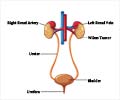According to the finding by UC Davis Cancer Center researchers cancer gene's own repair mechanism would rule out all the problems in treating kidney cancer.
In a ground-breaking discovery, scientists have for the first time found the ways to block a cancer gene's own repair mechanism, thus making chemotherapy for kidney cancer more effective and better tolerated.
The finding by UC Davis Cancer Center researchers would rule out all the problems associated with current methods for treating kidney cancer.Kidney cancer is typically without symptoms until it has spread to other organs, however, newer chemotherapies show great promise for extending survival during later disease stages, but they can also be highly toxic.
"Cancer cells are notorious in their ability to rapidly create copies of themselves. While the latest medications slow down that process, they do not tend to be curative and have many side effects. We wanted to find ways to help make chemotherapeutics as effective as possible at the lowest doses possible," said Robert Weiss, a UC Davis professor of nephrology.
Newer medications work by destabilizing cancer cells at the DNA level, which reduces their ability to replicate.
It is known that the p21 gene plays an important role in restoring cancer cell DNA and potentially circumventing the benefits of those treatments, thus, researchers sought to identify compounds that could interrupt this pathway.
After testing thousands of compounds, the team closed in on 12 to bind to the recombinant protein p21.
Advertisement
"The results are very exciting, especially given how difficult kidney cancer has so far been to treat. Our work offers hope that in the future these p21 inhibitors can be refined and used in concert with other conventional as well as novel cancer treatments to increase the comfort and life spans of patients with kidney cancer," said Weiss.
Advertisement
And after testing those compounds with standard treatments in animal models, the researchers would go for human trials.
"The goal is to find new approaches to treating a cancer for which few options currently exist and make those approaches available in clinical settings as quickly as possible," said Weiss.
The findings of the study are published in the current issue of Cancer Biology and Therapy.
Source-ANI
PRI/L















